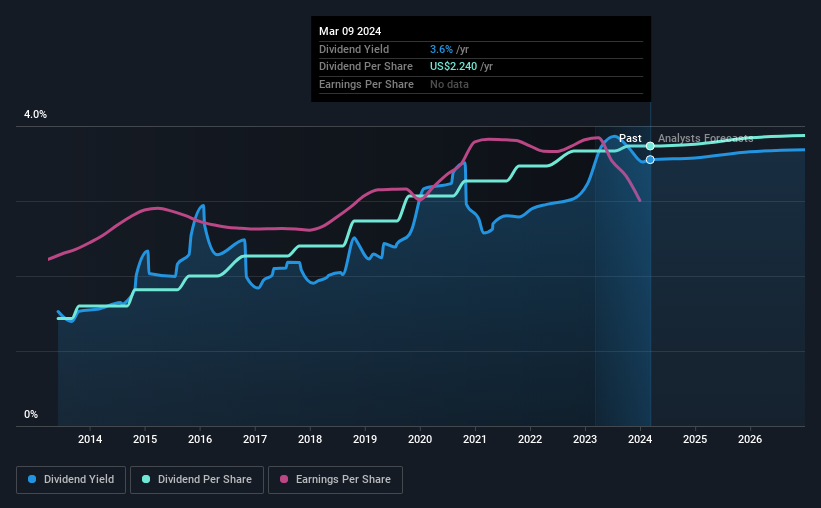Income Investors Should Know That Prosperity Bancshares, Inc. (NYSE:PB) Goes Ex-Dividend Soon
It looks like Prosperity Bancshares, Inc. (NYSE:PB) is about to go ex-dividend in the next four days. The ex-dividend date is one business day before a company's record date, which is the date on which the company determines which shareholders are entitled to receive a dividend. The ex-dividend date is of consequence because whenever a stock is bought or sold, the trade takes at least two business day to settle. In other words, investors can purchase Prosperity Bancshares' shares before the 14th of March in order to be eligible for the dividend, which will be paid on the 1st of April.
The company's next dividend payment will be US$0.56 per share, on the back of last year when the company paid a total of US$2.24 to shareholders. Looking at the last 12 months of distributions, Prosperity Bancshares has a trailing yield of approximately 3.6% on its current stock price of US$63.07. We love seeing companies pay a dividend, but it's also important to be sure that laying the golden eggs isn't going to kill our golden goose! So we need to investigate whether Prosperity Bancshares can afford its dividend, and if the dividend could grow.
View our latest analysis for Prosperity Bancshares
Dividends are typically paid from company earnings. If a company pays more in dividends than it earned in profit, then the dividend could be unsustainable. That's why it's good to see Prosperity Bancshares paying out a modest 49% of its earnings.
Generally speaking, the lower a company's payout ratios, the more resilient its dividend usually is.
Click here to see the company's payout ratio, plus analyst estimates of its future dividends.
Have Earnings And Dividends Been Growing?
Stocks with flat earnings can still be attractive dividend payers, but it is important to be more conservative with your approach and demand a greater margin for safety when it comes to dividend sustainability. Investors love dividends, so if earnings fall and the dividend is reduced, expect a stock to be sold off heavily at the same time. That explains why we're not overly excited about Prosperity Bancshares's flat earnings over the past five years. We'd take that over an earnings decline any day, but in the long run, the best dividend stocks all grow their earnings per share.
The main way most investors will assess a company's dividend prospects is by checking the historical rate of dividend growth. Since the start of our data, 10 years ago, Prosperity Bancshares has lifted its dividend by approximately 10% a year on average.
To Sum It Up
From a dividend perspective, should investors buy or avoid Prosperity Bancshares? Prosperity Bancshares's earnings per share are basically flat over the past five years, although it has the cushion of a low payout ratio, which would suggest a cut to the dividend is relatively unlikely. At best we would put it on a watch-list to see if business conditions improve, as it doesn't look like a clear opportunity right now.
If you want to look further into Prosperity Bancshares, it's worth knowing the risks this business faces. Our analysis shows 2 warning signs for Prosperity Bancshares and you should be aware of these before buying any shares.
A common investing mistake is buying the first interesting stock you see. Here you can find a full list of high-yield dividend stocks.
Have feedback on this article? Concerned about the content? Get in touch with us directly. Alternatively, email editorial-team (at) simplywallst.com.
This article by Simply Wall St is general in nature. We provide commentary based on historical data and analyst forecasts only using an unbiased methodology and our articles are not intended to be financial advice. It does not constitute a recommendation to buy or sell any stock, and does not take account of your objectives, or your financial situation. We aim to bring you long-term focused analysis driven by fundamental data. Note that our analysis may not factor in the latest price-sensitive company announcements or qualitative material. Simply Wall St has no position in any stocks mentioned.

